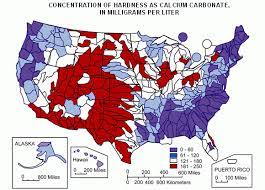When you look at a map of the United States where hard water exists, you’ll quickly discover that almost everyone deals with this issue. Approximately 85% of Americans have it, Indianapolis, Las Vegas, Minneapolis, Phoenix, San Antonio, and Tampa having the reputation for having some of the hardest urban supplies in the country.
Hard water occurs when dissolved magnesium and calcium occur at high levels. Although it isn’t a health hazard, it is a nuisance for home and business owners. The minerals can build up on the plumbing fixtures, contribute to poor detergent performance, and impact the flavor of what you drink.
One of the fastest and most affordable ways to manage an issue with hard water is to treat it. Instead of using salt, potassium, or chemicals like a traditional softener, FilterSmart systems use high-purity coconut shell carbon to generate the necessary filtration for an improved supply.
What States Have the Hardest Water?

Many maps that indicate hard water in the United States only measure it by reviewing the calcium carbonate in the supply. With information supplied by the U.S. Geological Survey, the grains per gallon measurement becomes more accurate.
That data includes daily streamflow conditions that show current water levels compared to historical records.
What we discover is that most coastal areas have slightly or moderately hard water. Although cities like Tampa and Indianapolis stand out, the states are typically moderate to hard.
The U.S. Geological Survey defines very hard water as being 10.5 grains per gallon or higher. Here are the states where water treatment is almost mandatory if you don’t want to deal with the symptoms of having minerals in your supply.
1. Utah
Almost the entire state of Utah currently has very hard water. The only exception is the far eastern border with Colorado. If you’re not treating your supply, your clothing will feel dingy and stiff. Your dishes might look dirty all the time, or mineral layers can start building on your tile. Readings taken in Salt Lake City are consistently around 13 grains per gallon.
2. Wyoming
The presence of lime in the Rocky Mountains contributes to the hard water levels found in this state. It only has two small pockets where the readings are below 10.5 grains per gallon. The high calcium levels often contribute to farming and food processing issues because scale buildup affects the irrigators and processing equipment.
3. Colorado
This state’s unique topography contributes to the hard water levels that its residents experience. Not only do the Rocky Mountains cut through the state, but there is also a high desert climate along the Western Slope. You will find an area of only moderately hard water near the southern border, along with a couple of regions where the grains per gallon reading hovers around seven.
4. Texas
If you live along the eastern border or the coastline of this state, your water supply is probably slightly or moderately hard. When your home is in the western counties, you’re almost guaranteed to have very hard water. As rain falls on the state, it tends to gather in the various aquifers, lakes, and reservoirs. The rock formations start leeching their minerals into the supply, producing quality issues that might require a reverse osmosis system to solve.
5. New Mexico
Most of this state’s water comes from private or public wells. The primary source that supplies the underground tables is the Pecos River Basin and the aquifers in that range. As you move into the state’s interior where long distances and desert environments create evaporation challenges, the hardness levels can get quite high. Roswell consistently reads near 25 grains per gallon.
6. Kansas
Many Kansas residents get their water from underground wells. The ground is rich in magnesium and calcium, which makes its way to the underground tables. What makes the supply unique in this state is that it also has high iron levels, generating a reddish color or tint to the fluid when extracted from some wells, especially in Sedgewick County.
What Can I Do About My Hard Water?
You can treat hard water to eliminate its annoyances. Although there aren’t primary or secondary standards released for total mineralization levels, it is helpful to filter your supply to keep maintenance costs low.
The decision to soften or filter water is a personal one. Whether you want whole house filtration or a reverse osmosis unit that fits under your sink, our solutions provide an affordable way to protect your plumbing and appliances.
FilterSmart team can deliver one system for all the water in your home. Contact us today or explore our product line to discover how life improves when you’re not constantly dealing with hard water.






